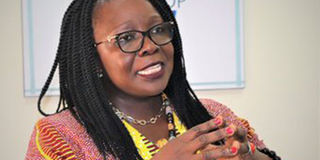Uganda among worst in human development globally - UN report

The UNDP resident representative in Uganda, Ms Elsie Attafuah
What you need to know:
- Norway came best performing country, followed by Switzerland, and Ireland in 3rd. Hong Kong, China and Germany made a tie in the fourth position.
- Prof Augustine Nuwagaba, an economist from Makerere University, said despite Uganda having a growth rate almost three times that of Norway, it still performs poorly.
The Human Development Report 2019, conducted by the United Nations Development Programme (UNDP), a United Nations (UN) agency has rated Uganda, among the worst performing countries in terms of human development globally.
Conducted and released under the theme, “Beyond income, beyond averages, beyond today: Inequalities in human development in the 21st century,” the report presents values and ranks for 189 countries and UN-recognised territories.
The report that was released last week in Kampala, premised its findings on data captured in the Human Development Report Office (HDRO) as of July 2019.
The report positioned Uganda in 159 place out of the 189 countries assessed. “Uganda’s Human Development Index value for 2018 is 0.528-which put the country in the low human development category-positioning it at 159 out of 189 countries and territories,” the report reads in part.
This therefore implies that Uganda is, among the last 30 performing countries globally in the realm of human development.
The report indicates that human development means “the substantive freedom to do things that people value and have reason to have.”
The rank is also shared with Uganda’s neighbours to the South, Tanzania.
“Between 1990 and 2018, Uganda’s Human Development Index (HDI) value increased from 0.312 to 0.528, an increase of 69.1 per cent,” the report further indicates.
The report further shows that Uganda’s human inequality coefficient is 26.7 per cent, inequality in life expectancy at birth is 27.2 per cent, inequality of education is 27.9 per cent and inequality in income is 24.9 per cent.
Other countries
Norway came best performing country, followed by Switzerland, and Ireland in 3rd. Hong Kong, China and Germany made a tie in the fourth position.
Prof Augustine Nuwagaba, an economist from Makerere University, said despite Uganda having a growth rate almost three times that of Norway, it still performs poorly.
“Growth is not linked with human development. If you look at the countries of highest human development Index in this case Norway, it is growing at only 1.7 per cent but Uganda is growing at 6.2 per cent. What is important is that this growth has a trickle down effect where you have everybody partaking of the growth and there is due distribution of that growth” Mr Nuwagaba said.
The UNDP resident representative in Uganda, Ms Elsie Attafuah, said there has been a shift in poverty concentration from northern to eastern Uganda.
“Unfortunately, lately, we have been observing some reversal indicators and slow progress. These include arise in poverty from 19.5 per cent in 2012/2013 t0 21.4 per cent in 2016/2017,” Ms Attafuah said.
Ms Attefuah also noted that males in Uganda have higher chances of schooling as compared to their female counterparts.
“Despite unprecedented progress in all aspects of human development, systematic inequalities in human development remain deeply rooted. For example, if we take basic capability indicator for access to knowledge between male and female, females in Uganda have only 4.8 years of schooling while males have close to 7.4 years indicating a wider gender gap,” she said.
Ms Attefuah recommends government to always evaluate plans before implementation.
“We should be able to foresee risks that impact inequality such as climate change and technological advancement,” she said.
The chairperson of the National Planning Authority (NPA), Ms Pamela Mbabazi, said the third National Development Plan (NDPIII) will focus on improving livelihoods of Ugandans.




